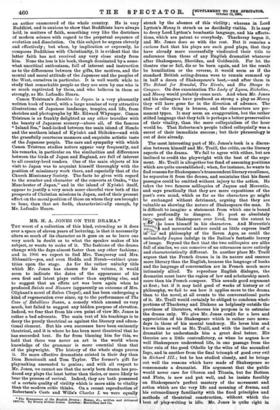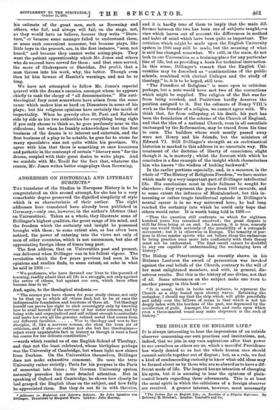MR. H. A. JONES ON THE DRAMA.*
THE worst of a collection of this kind, extending as it does over a space of eleven years of lecturing, is that it necessarily alters so much of its character as it goes on as to leave one very much in doubt as to what the speaker makes of his subject, or wants to make of it. The fashions of the drama change with the days almost faster than any other fashions ; and in 1900 we expect to find Mrs. Tanqueray and Mrs. Ebbemith—yes, and even Hedda and Norah—extinct quan- tities upon the stage. As for the rather unlucky title which Mr. Jones has chosen for his volume, it would seem to indicate the dates of the appearance of his own first and latest plays rather than anything else, and to suggest that an effete art was born again when he produced Saints and Sinners (apparently an outcome of Mrs. Oliphant's novel of Salem Chapel), and has been undergoing a kind of regeneration ever since, up to the performance of The Case of Rebellious Susan, a comedy which amused us very much, but failed to suggest any hidden purpose of elevation. Indeed, we fear that from his own point of view Mr. Jones is rather a bad advocate. The main text of his teachings is to decry the purely theatrical as against the literary and educa- tional element. But his own successes have been eminently theatrical, and it is where he has been most theatrical that he has succeeded best. So far from blaming him for this, we hold that there was never an art in the world where knowledge of the grammar is more essential than that of the playwright. The history of the whole stage proves it. No more effective dramatists existed in their day than Dion Boucicault and Tom Taylor. The former's gift for playmaking amounted to genius ; and with all respect to Mr. Jones, we cannot see that the newly born drama has pro- duced any plays the least better than theirs, or more likely to bear the process of revival. Indeed, they are both possessed of a certain quality of virility which is more akin to vitality than the modern critic thinks. On a recent reproduction of Robertson's Caste and Wills's Charles I. we were equally • The Renascence of the Rnglish Drama : Essays, &a, written and delivered 1/133 94. By Henry Arthur Jones. London ; Macmillan and Co.
struck by the absence of this virility ; whereas in Lord Lytton's Money it struck us as decidedly visible. It is easy to decry Lord Lytton's bombastic language, and his affecta- tions, which are patent to everybody. Thackeray began it, and Mr. Jones does so with the rest. But it remains a curious fact that his plays are such good plays, that they have already more successfully vindicated their title to endurance than those of any English dramatist whatever after Shakespeare, Sheridan, and Goldsmith. For let the theatre rise or fall, die or be born again, and let the result be humiliation or the reverse, it would seem as if the standard British acting-drama were to remain summed up in half a dozen of Shakespeare's best,—and after them in The School for Scandal, The Rivals, and She Stoops to Conquer. On due examination The Lady of Lyons, Richelieu, and Money would probably come next. And when Mr. Jones and his colleagues have produced as strong a play as Money they will have gone far in the direction of advance. The fibre of the thing is human, and the characters are per- manent types. It may seem an exaggeration, but the rather stilted language that they talk is perhaps a better preservative of their vitality, than the mere colloquialism of the hour would be. That Robertson's people talked colloquially was a secret of their immediate success ; but their phraseology is out of date already.
The most interesting part of Mr. Jones's book is a discus- sion between himself and Mr. Traill, the critic, on the literary aspects of the drama. We fail to agree with either, but are inclined to credit the playwright with the best of the argu- ment. Mr. Traill is altogether too fond of assuming positions which are quite unestablished ; when, for instance, he wants to find reasons for Shakespeare's transcendent literary excellence, he separates it from the drama, and maintains that his finest passages could be omitted without injury to the action. He takes the two famous soliloquies of Jaques and Meroutio, and says practically that they are mere expositions of the poet's own mind, which as far as the characters go might be exchanged without detriment, arguing that they are valuable as showing the nature of Shakespeare the man. It is difficult to imagine a statement from which one is bound more profoundly to disagree. No poet so absolutely im-i •Nonal as Shakespeare ever lived, from the extent to To"xvt,ti e loses himself in his characters. And Mercutio's tap.00le, and mercurial nature could as little express itself in''._e.e sad philosophy of the Seven Ages, as could the melancholy Jaques indulge in the Italian's fantastic luxury of image. Beyond the fact that the two soliloquies are alike fall of similes, we can conceive of no utterances more entirely and characteristically different. In another place Mr. Traill argues that the French drama is in its nature and essence more literary than the English, because the language of books and the language of conversation are in French much more intimately allied. To reproduce English dialogue, the dramatist must leave the region of law and scholarship much more than his French compeer. This sounds good argument at first ; but if it may hold good of works of history or of philosophy, we fail to see how it applies more to the drama than to the novel, at all events to the conversational parts of it. Mr. Traill would certainly be obliged to condemn whole portions of Thackeray and Dickens as helplessly outside the provinces of literature, whereas his purpose is to ostracise the drama only. We give Mr. Jones credit for a love and appreciation of his Shakespeare which is rather rare nowa- days in those of his mental tendency. He loves him and knows him as well as Mr. Train, and with the instinct of a dramatist he understands him a great deal better. His theories are a little contradictory, as when he argues how well Shakespeare understood life, in one passage from the utter ruin of the good Othello by the wiles of the scoundrel Iago, and in another from the final triumph of good over evil in Richard III.; but he has studied closely, and he brings out well the reasons which have made of Shakespeare so consummate a dramatist. His argument that the public would never care for Oberon and Titania, but for Bottom and Flute, is new and put well, and he insists forcibly on Shakespeare's perfect mastery of the movement and action which are the very life and meaning of drama, and his extraordinary familiarity with the fixed principles and methods of theatrical construction, without which the best of play-writing is idle. Mr. Jones is quite right in
his estimate of the great men, such as Browning and others, who fail, and always will fail, on the stage, not, 83 they would have us believe, because they write "litera- ture," or because some manager failed to understand them, or some such convenient nonsense, but because plays, like little boys in the proverb, are, in the first instance, " seen, not heard," and because they cannot write acting-plays. They want the patient apprenticeship which Mr. Jones and others who do succeed have served for them ; and that once served, the more of Shakespeare or Sheridan, Dei gratict, that a man throws into his work, why, the better. Though even then let him beware of Hamlet's warnings, and not be to long.
We have not attempted to follow Mr. Jones's especial quarrel with the drama's enemies, amongst whom he appears chiefly to rank the clergy of "all denominations." His anti- theological fury must somewhere have arisen from the same cause which makes him so hard on Dissenters in some of his plays; but his religious opinions have certainly the merit of impartiality. When he gravely cites St. Paul and Rabelais side by side as his two authorities for everything being right if you only choose to think so, he goes perilously near to the ridiculous ; but when he frankly acknowledges that the first business of the drama is to interest and entertain, and the first business of a play to be actable, he goes far to atone for many speculative sins not quite within his province. We agree with him that there is something at once humorous and pathetic in the contempt of certain "literary men" for the drama, coupled with their great desire to write plays. And we condole with Mr. Traill for the fact that, whatever the reason, Mr. Jones writes better stage-plays than Browning.



















































 Previous page
Previous page